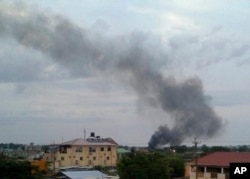A spokesman for Sudanese opposition leader Riek Machar has called on the international community not to engage or acknowledge Taban Deng Gai, who recently replaced Machar as the deputy to South Sudan President Salva Kiir.
Machar's spokesman James Gadet Dak says the peace accord signed between President Kiir and Machar has collapsed following Kiir’s decision to appoint Taban Deng Gai. Deng was the chief negotiator for the Sudan People’s Liberation Movement in opposition (SPLM-IO) in talks with the government in Juba to end the country’s recent conflict.
“The peace agreement is collapsing because we are at war now… As fighting is going on now around Juba. They have attacked our positions around Juba for the last number of days. So fighting has been continuing and President Salva Kiir has been violating the cease-fire which they declared… So there is no peace agreement and implementation,” said Dak. “We have been calling for a deployment of a third force in Juba so that the situation can be corrected. But if that does not happen, then we would be forced to move on to Juba and take control of the capital, so this is the situation we are in now.”
South Sudan has been ripped apart by political and ethnic violence since fighting erupted between pro-Kiir and pro-Machar army factions in December 2013. Tens of thousands of people have died and more than two million have been displaced from their homes, many to neighboring countries.
A peace deal between the government and opposition signed last August led to creation of a transitional government with Machar as first vice president. But the agreement was severely tested this month by several days of fighting in Juba that killed at least 300 people.
Machar has not been seen in public since attending a news conference at the presidential palace on July 8.
South Sudan’s second Vice President James Wani Igga said Deng would soon lead a delegation to the United Nations in New York to explain the new changes made to the opposition party. He also said President Kiir has encouraged the SPLM-IO members currently In Juba to meet officials of regional bloc, the Intergovernmental Authority on Development (IGAD) to dispel any suspicions that may have arisen from the replacement of Machar.
“The United Nations should not give him an audience because he is illegitimate; his nomination was illegal and his appointment was illegal. So he should not be given an audience in New York by the United Nations to try to justify his nomination,” said Dak.
Last week, Machar said his forces are ready to march to Juba and take control. This, after accusing Kiir and the national army of attacking the positions of troops loyal to him in various parts of the country. But supporters of President Kiir sharply condemned Machar’s statement saying it is a call to war, which could create instability and plunge the country into yet another civil war.
Dak disagreed. “Not a call for war, it is about a war which has been re-imposed on the people of South Sudan by President Salva Kiir…By saying that we can move on to Juba it means that it is in defense of ourselves and of course to take control of Juba where there is lawlessness comes from,” said Dak.






